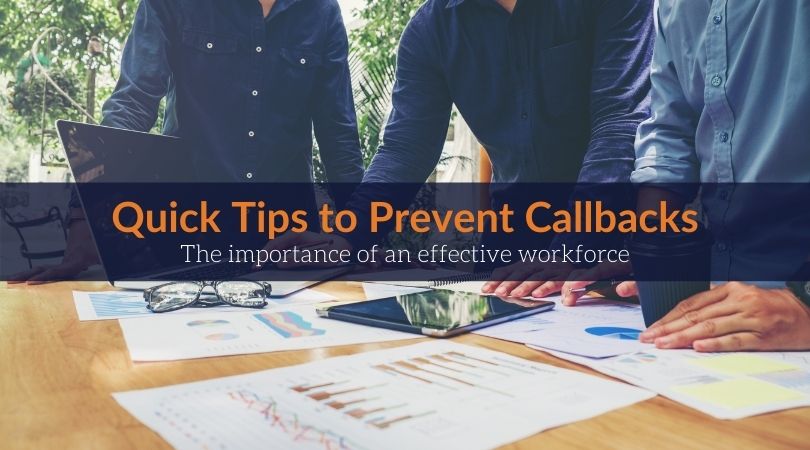The importance of an effective workforce
Contractors deal with many issues on a daily basis, don’t let callbacks be one that is constantly nagging at you. There are ways to prevent them from happening.
Preventing callbacks is a constant process between the contractors and the clients. It does not mean doing better at just one job, but being more business minded and how you train your employees. Preventing callbacks will save time, money, better morale, and a more positive reputation for your company.
Callbacks – What do they cost?
Callbacks are due to three main reasons. The first is poor cleanup, secondly, leak related, and finally high-cost callbacks.
Here are examples of what callbacks could cost your company:
Cleanup-Related Callbacks Average $100.
When a worksite is poorly cleaned, you would generally send a worker or a foreman. This foreman will be trained to make sure the site is cleaned perfectly. If that person is trained well, they will clean the site, and make sure the mess doesn’t happen again under their watch. These costs add from time, both travel, and worker salary.
Leak-Related Callbacks Average $200-$400
Leaks are tricky to price out. It all depends on how big or small, where the leak is on the roof, how much labor and materials cost. It is important to send an experienced employee who can source the problem, and fix it quickly and cheaply.
High Cost Callbacks Vary From $500-$2500+
Getting one of these calls is something you do not want to get. The causes can be from improper installation, failed inspections, failure of materials, and more. These can be avoidable, but oftentimes are out of your hands as the contractor. Costs can vary depending on what needs done.
Preventing Callbacks
Callbacks are expensive, so it is important to figure out why they are happening and learn how to prevent them. It is important to be clear with customers up front about your callback policy.
Callbacks are inevitable, but a good install crew and cleanup crew can help to lower the number of them. Training new hires as well as updating training for seasoned installers will help to keep them up to date and know all the policies for a job so they can complete it fully.
Standard Operating Procedures(SOP) are an important step to prevent leak-related and other callbacks.Contractors need a clear and precise SOP so they can count on their employees to get the job done right. A checklist is oftentimes good for a step by step process on what employees do at a job site. This will in turn train them on what to look out for in order to reduce callbacks.
Additionally, A Foreman should be on each and every job and be trained, loyal, and ready to do the job right. Leadership training will help them enforce the SOP and be able to help out where necessary. A good leader will take notes, report back to management, and ultimately make sure everything is done and in order to the best quality standards for your business.
The final way to ensure less callbacks is to empower your workers. There are many levels of employees from management to cleanup crew. Proper training throughout the ranks is necessary to a smooth running operation and less turnover in employees. A cleanup crew will need more motivation and empowerment. Their job is generally less paid and takes less training. Incentivize them with pay raises, training, and encourage them to move up in the company.
Final Thoughts
Callbacks are inevitable, but it is important to take these simple steps to help reduce the number of them. Training employees, empowering workers, having the proper SOP’s and proper management training will help to reduce the number of callbacks. Taking these tips and implementing them into your business and making them your own are important. Implement the plan, update the plan, and follow through will keep your callbacks lowered for years to come.








